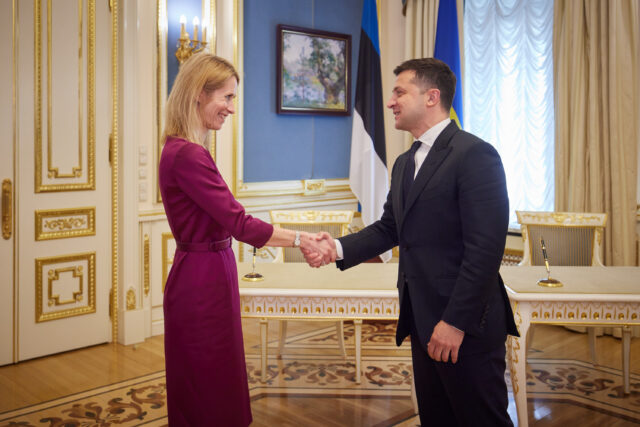File photo of Estonian Prime Minister Kaja Kallas with Ukrainian President Volodymyr Zelenskyy
The Kremlin now hopes this move will help to silence me and others – but it won’t.
The opposite. I will continue my strong support to Ukraine. I will continue to stand for increasing Europe’s defence. 3/— Kaja Kallas (@kajakallas) February 13, 2024
On Tuesday, Kallas took to X, formerly Twitter, to declare that “Russia’s move is nothing surprising. This is yet more proof that I am doing the right thing – the #EU’s strong support to #Ukraine is a success and it hurts Russia.
“I’ve always said Russia’s toolbox hasn’t changed. Throughout history, Russia has veiled its repressions behind so-called law enforcement agencies. I know this from my family history. When my grandmother and mother were deported to Siberia, the KGB issued the arrest warrant.
The Kremlin now hopes this move will help to silence me and others – but it won’t. The opposite. I will continue my strong support to Ukraine. I will continue to stand for increasing Europe’s defence,” she said. .
A former part of the Soviet Union, Estonia joined the European Union and acceded to NATO in 2004. Russian President Vladimir Putin’s decision to invade Ukraine sparked concern in Estonia that it could be next.
According to CNN, “a report by the Estonian Foreign Intelligence Service said Russia may consider doubling the number of troops stationed on its border with the Baltic countries and increasing those on its frontier with Finland, which joined NATO last year.”
“Estonia’s defense budget is slated to rise to more than 3% of the country’s GDP for the first time this year, well above the 2% threshold target NATO has set for members of the alliance,” said the CNN report.
Also see:
In a career spanning three decades and counting, Ramananda (Ram to his friends) has been the foreign editor of The Telegraph, Outlook Magazine and the New Indian Express. He helped set up rediff.com’s editorial operations in San Jose and New York, helmed sify.com, and was the founder editor of India.com.
His work has featured in national and international publications like the Al Jazeera Centre for Studies, Global Times and Ashahi Shimbun. But his one constant over all these years, he says, has been the attempt to understand rising India’s place in the world.
He can rustle up a mean salad, his oil-less pepper chicken is to die for, and all it takes is some beer and rhythm and blues to rock his soul.
Talk to him about foreign and strategic affairs, media, South Asia, China, and of course India.





